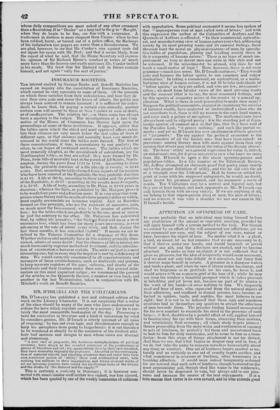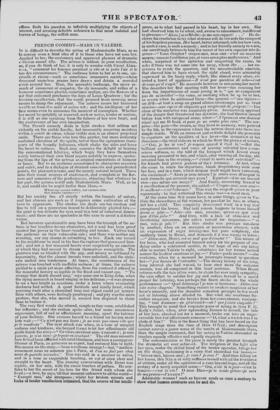AFFECTION AN OFFSPRING OF CARE.
IT seems probable that an individual may bring himself to love any production of the animal or vegelable creation, provided he will apply himself with a certain method to the task. For though we cannot by an effort of the will command our affections, yet we can command our care, and the subject of our care, sooner or later, becomes the object of love. No matter what it is - a plant, a bird, an insect, let us but conceive that we are necessary to it, that it thrives under our hands, and would languish or perish without our aid, and the affections are excited, and we become attached. To make us love an object, it is not sufficient that it gives us pleasure, but the idea of reciprocity would seem necessary, and we must not only take delight in it ourselves, but fancy that it derives some benefit in return. A prisoner in a dungeon waters and tends a plant, and when he sees it bloom under his charge, and shed its fragrance as in gratitude for his care, he loves it, and would grieve vOth no common grief at the loss of it ; while he may see from his window a beautiful prospect which les takes pleasure in beholding and yet loves not, because no part of its glories is the work of his hands—it owes nothing to him. We frequently read and hear of men, who, separated from the natural objects of their affections, and confined in dismal prisons, have become at- tached to spiders, toads, and reptiles, the most hideous to our sight ; but it is not to be believed that these ugly and repulsive creatures had in themselves any qualities to attract the affections of men towards them. The prisoner finding himself necessitated for his own comfort to reconcile his mind to the presence of such beings, at first, doubtless by a painful effort of will, applied himself to familiarizing his eye with their forms, observing their motions, and scrutinizing their economy ; all which study begets interest : thence proceeding front the mere whim and wantonness of vacancy to acts of kindness, he probably fed them and accustomed them to look to him for daily sustenance, and to come to him as a bene- factor: from this stage of things attachment is not tar distant. And thus we see, that what begins in disgust may end in love, if we do hut take the pains to concern ourselves benevolently about any thing or creature. One act of kindness begets another as na- turally and as certainly as one act of cruelty begets another, and what commenced in aversion or loathing, often terminates in a touching affection. It would seem indeed benignantly oidained for our reward, that such acts of kindness, though bestowed on che most unpromising soil, though shed like water in the wilderness, should never be dispensed in vain, but always add to our plea- sures and increase the .source of the best enjoyments. It is a trite maxim that virtue is its own reward, and be who extends good



















 Previous page
Previous page